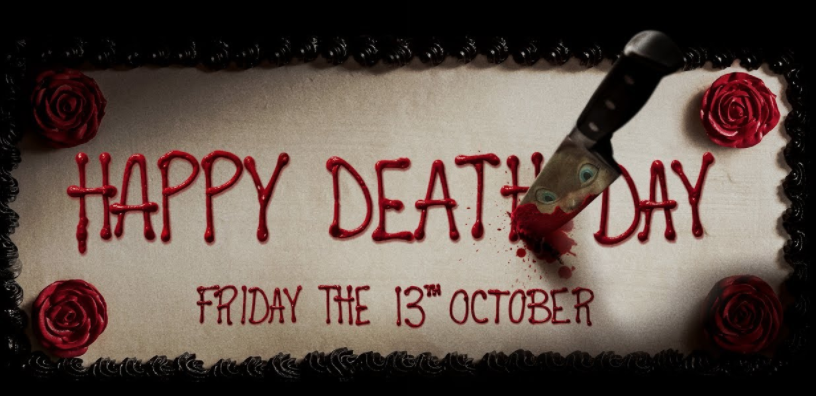With every October comes the requisite release of at least three to five horror movies, usually only one of which serves up the camp factor. This year, it’s Christopher Landon’s Happy Death Day. Though Landon’s work is better known in terms of screenwriting–major hits like Disturbia and the follow-ups to Paranormal Activity boosting his resume–his direction of Scott Lobdell’s script proves his capability in both arenas of filmmaking.
Following the plight of sorority girl Tree–that’s right, Tree–Gelbman (Jessica Rothe) as she is forced to relive the day of her death–incidentally the day of her birth–ad nauseum until she finally figures out who her killer is, Lobdell imbues the screenplay with a tone vaguely reminiscent of Gossip Girl (it’s not dark enough to warrant a Scream Queens comparison). Being that Tree lives in a sorority house, there is, of course, ample opportunity for snark, generally stemming from the house leader, Danielle Bouseman (Rachel Matthews), who relishes monitoring sluttery and condemning eating. She also even manages to sneak in an impression of a mentally challenged person, which on its own probably warranted the PG-13 rating as political correctness definitely doesn’t allow for this sort of scene anymore.
Thus, Danielle plays the Blair to Tree, who doesn’t just look a lot like Serena Van Der Woodsen (Blake Lively), but also plays a similar part–that of a girl whose every action seems to be carefully observed by the school. The Dan Humphrey of the narrative is Carter Davis (Israel Broussard), the “losery” awkward boy whose dorm she wakes up in each morning after he escorts her back there in her drunken state the night before. Though the original trailer for the film featured the far more comical “In Da Club” ringtone to wake her up every time with, “Go shorty, it’s ya birthday,” perhaps a budget of 4.5 million dollars wasn’t enough to keep the rights to it, ergo the replacement with a far more unpleasant and nondescript option.
Like any amount of constant repetition, Tree quickly grows annoyed not only with having to re-experience her murder, but also the mundane details of the day itself, which she has down pat by the second act–from sprinklers and car alarms going off to the rote script of those around her, including her med student roommate, Lori Spengler (Ruby Modine), who judgingly welcomes her each morning with, “She finally rolls in” and then presents her with a home baked cupcake.
Tree must also deal with the douche baggery of the professor she’s clichely having an affair with, Gregory Butler (Charles Aitken). And the more she deals with him on her birth/death day, the more she is forced to face the fact that she’s turned into a rather shitty person. For, as she faux philosophically puts it, “You relive the same day over and over again, you kind of start to see who you really are.” Thus, the message of the film isn’t totally lacking with its notion of perpetual rebirth allowing us the opportunity to become the best version of ourselves as we correct our mistakes.
That’s what the progenitor of Happy Death Day‘s concept, Bill Murray as Phil Connors, does in Groundhog Day, too. And yes, in the typical meta nature of the “youthful generation” Carter does refer to Tree’s situation as being an exact replica of Groundhog Day. Then again the true progenitor of this whole “doomed to repeat the same hell all day, errday” doctrine was Sisyphus, who really ought to have just let the boulder bowl him over. In this regard, he might have been more deserving of playing the protagonist in this movie. As Tree, with nothing else to do but work on the self, becomes more in tune with who she used to be before a tragic event and joining a sorority turned her into something of a bitch, she gets ever closer to figuring out who her killer is. And in Gossip Girl fashion, it has some very petty mean girl motives behind that near toothless pig grin. But that’s the way of the world now, isn’t it? Sometimes we simply want to kill people because the jealousy they invoke can bug the shit out of us. Hence, Happy Death Day is more of a commentary on modern society than Groundhog Day ever was.






















